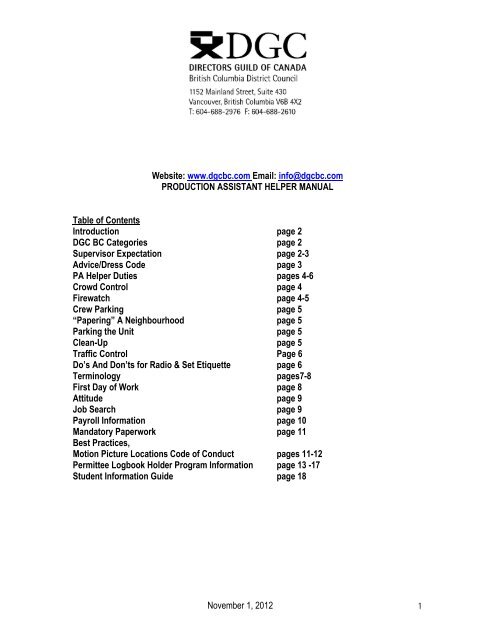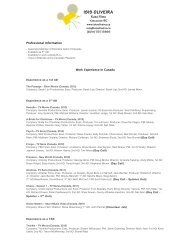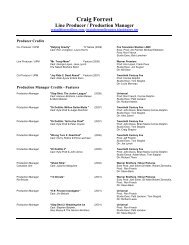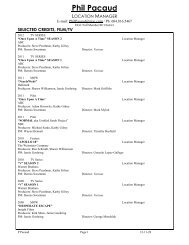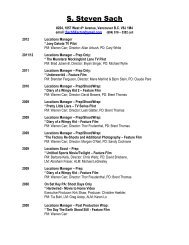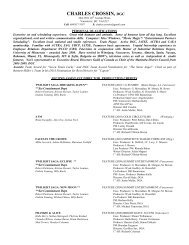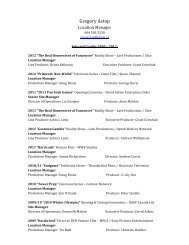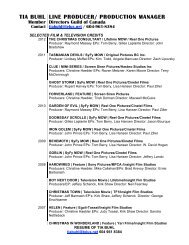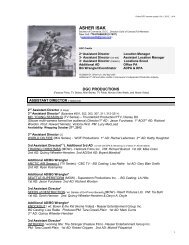Info@dgcbc - Directors Guild of Canada - BC District Council
Info@dgcbc - Directors Guild of Canada - BC District Council
Info@dgcbc - Directors Guild of Canada - BC District Council
Create successful ePaper yourself
Turn your PDF publications into a flip-book with our unique Google optimized e-Paper software.
Website: www.dgcbc.com Email: info@dgcbc.com<br />
PRODUCTION ASSISTANT HELPER MANUAL<br />
Table <strong>of</strong> Contents<br />
Introduction page 2<br />
DGC <strong>BC</strong> Categories page 2<br />
Supervisor Expectation page 2-3<br />
Advice/Dress Code page 3<br />
PA Helper Duties pages 4-6<br />
Crowd Control page 4<br />
Firewatch page 4-5<br />
Crew Parking page 5<br />
“Papering” A Neighbourhood page 5<br />
Parking the Unit page 5<br />
Clean-Up page 5<br />
Traffic Control Page 6<br />
Do‟s And Don‟ts for Radio & Set Etiquette page 6<br />
Terminology pages7-8<br />
First Day <strong>of</strong> Work page 8<br />
Attitude page 9<br />
Job Search page 9<br />
Payroll Information page 10<br />
Mandatory Paperwork page 11<br />
Best Practices,<br />
Motion Picture Locations Code <strong>of</strong> Conduct pages 11-12<br />
Permittee Logbook Holder Program Information page 13 -17<br />
Student Information Guide page 18<br />
November 1, 2012
INTRODUCTION<br />
The <strong>Directors</strong> <strong>Guild</strong> <strong>of</strong> <strong>Canada</strong>, British Columbia (DGC <strong>BC</strong>) is a labour organization that represents<br />
key creative and logistical personnel in the film industry. The DGC <strong>BC</strong> Collective Agreement covers<br />
the Director, Production/Unit Manager, Assistant <strong>Directors</strong>, Location Department and Production<br />
Assistants (PAs). As the DGC <strong>BC</strong> is a membership based organization, preference <strong>of</strong> engagement<br />
is always given to Members first.<br />
The Locations Department relies on a number <strong>of</strong> PA Helpers to assist with duties when a<br />
production shoots “on location.” PA Helpers can also be called to help out on studio or set shooting<br />
days.<br />
For those who have not worked in the industry, this document provides an important overview <strong>of</strong><br />
the Locations Department expectations.<br />
Completion <strong>of</strong> the DGC <strong>BC</strong> Permittee Program is a requirement for DGC Membership<br />
consideration. To qualify for entry in the Program, individuals are required to complete a<br />
number <strong>of</strong> courses, work days on DGC <strong>BC</strong> signatory productions and write an exam. An<br />
outline <strong>of</strong> the Program requirements can be located on website www.dgcbc.com, or the<br />
DGC <strong>BC</strong> <strong>of</strong>fice.<br />
DGC <strong>BC</strong> CATEGORIES<br />
Director<br />
PM: Production Manager*<br />
UM: Unit Manager<br />
1 st AD: 1 st Assistant Director*<br />
2 nd AD: 2 nd Assistant Director<br />
3 rd AD: 3 rd Assistant Director<br />
AAD-BKC Additional Assistant Director – Background Coordinator<br />
TAD: Trainee Assistant Director<br />
LM: Location Manager*<br />
ALM: Assistant Location Manager<br />
LS: Location Scout<br />
TAL: Trainee Assistant Location Manager<br />
PA: Production Assistant<br />
* denotes the head <strong>of</strong> the department<br />
YOUR SUPERVISOR WILL EXPECT YOU TO:<br />
• Have an incredibly good attitude<br />
• Dress conservatively and appropriately for various weather conditions<br />
• Be reliable – on time and properly equipped<br />
• Have endurance<br />
• Be tolerant and adaptable to other personality types<br />
• Be pr<strong>of</strong>essional at all times<br />
• Be able to work well under pressure<br />
• Demonstrate strong public relation skills<br />
• Have a good sense <strong>of</strong> humour<br />
November 1, 2012
Stay alert – watch for possible problems, inform the right people and listen to your radio and watch<br />
your area <strong>of</strong> responsibility.<br />
Watch your language – radios are monitored and the public is listening. Importantly, do not swear<br />
but use calm and non-alarmist language, especially in an emergency.<br />
Wear or use the safety gear you are issued - (vest/paddle/hard hat etc. – ear plugs may not be<br />
appropriate). Listen and abide by safety meetings.<br />
Never manhandle anyone – speak pr<strong>of</strong>essionally, politely request people‟s cooperation.<br />
Don‟t touch, move, or help carry equipment, set dec, props etc. without asking (or being<br />
asked to.)<br />
PA HELPER DUTIES:<br />
ALMs need the assistance <strong>of</strong> a varying number <strong>of</strong> PAs for each „on location‟ shooting day and a<br />
smaller number <strong>of</strong> PAs to help out on „studio‟ or „set‟ shooting days. Some <strong>of</strong> your duties are<br />
outlined below:<br />
Crowd Control:<br />
While on location, you may be asked to stop, re-route or otherwise control pedestrian traffic. While<br />
dealing directly with the public, use extreme caution and be very polite at all times.<br />
Rather than using words such as “you can‟t”, <strong>of</strong>fer alternatives and information about why there is a<br />
delay or detour. For instance, if filming is being done in a store on Robson Street and you have<br />
been told not to let pedestrian traffic down the sidewalk, you would stop pedestrian traffic as soon<br />
as the 1st AD calls “Stand by” or “Lock it up”. You should continue to stop all traffic as per your<br />
instructions. If, during that time, somebody wants to get by, ask them if they could wait for a few<br />
minutes or, if they are unable to wait, ask if it is possible for them to cross the street and walk up<br />
the opposite sidewalk.<br />
If someone becomes extremely insistent, politely ask what the person‟s reasons are and call your<br />
department head for advice on how to accommodate them. Never forget that you are representing<br />
the production company and any rudeness or short-tempered answers will reflect badly on the<br />
company and potentially cause enormous expense to them. The film industry is dependent on the<br />
cooperation and goodwill <strong>of</strong> the public.<br />
Firewatch:<br />
At any time that the camera or lights are unattended, you may be asked to watch over the<br />
equipment to prevent theft or fire. As well, you may be asked to maintain a “hot set”, which means<br />
that the set must be maintained exactly as it was during the last shot. It is your responsibility to<br />
inform any crew or cast attempting to enter the set area that they are entering a hot set. Be polite<br />
and if someone insists on entering, get their name and, if possible, notify the superior who provided<br />
the hot set instructions. It is better to calmly let someone in and report it to your superior rather<br />
than to get into an argument. Make sure that anyone entering is well informed that they are<br />
entering a hot set; it is not your fault if they choose to enter against direction. However, it is your<br />
fault if you participate in a loud argument.<br />
Crew Parking:<br />
November 1, 2012
When the crew first begins to arrive at the location, you may be asked to supervise the crew<br />
parking lot. Make sure you wear a reflective vest so that you are easily recognized as a<br />
crewmember. You may be asked to hand out dash cards to the crew that will identify the car as<br />
belonging to the crew or cast <strong>of</strong> that particular film unit. If the company has rented the entire lot for<br />
the day, then it is your responsibility to inform other drivers that the lot is not available. Again,<br />
rather than simply telling people that they cannot park, try to <strong>of</strong>fer alternative suggestions.<br />
“Papering” A Neighbourhood:<br />
Prior to a film unit going into a neighbourhood for filming, you may be asked to drop letters <strong>of</strong>f to<br />
<strong>of</strong>fices, businesses and homes in the area. It is important that you dress for the public; be sure to<br />
wear a shirt with a collar and casual pants.<br />
These letters, which are generally written by the Location Manager, inform people <strong>of</strong> the production<br />
company name, and provide the dates and times <strong>of</strong> interruptions; they also indicate who to contact<br />
if questions or problems arise. The letter may also warn <strong>of</strong> anything that may particularly alarm<br />
locals, this includes events such as explosions, stunts and other actions that could be<br />
misinterpreted as a bona fide emergency.<br />
Thoroughly papering a neighbourhood is crucial because a film unit can be quite disruptive and<br />
people are far more likely to be impatient and angry if they have not been warned <strong>of</strong> the filming.<br />
Parking the Unit:<br />
When the trucks and mobile units begin to arrive on a set, you may be asked to coordinate the<br />
parking <strong>of</strong> these vehicles. You should park these vehicles as per your ALM‟s instructions, but<br />
generally the vehicles that should be parked the closest to set are the Camera Truck, Grip and<br />
Electric Truck, Props and Craft Service. The unit vehicles, which are parked slightly farther away,<br />
are the Makeup, Hair and Wardrobe units, Honey wagons, Mobile Dressing Rooms and Catering.<br />
Your Department head will let you know about any special unit parking requirements on each<br />
production. Parking the unit can <strong>of</strong>ten be a surprisingly sensitive issue. Use your discretion and<br />
report to a superior any problems rather than getting into an argument. Wear a reflective vest, have<br />
a stop/slow paddle nearby and watch out for low-hanging wires, trees and other hazards.<br />
Clean-Up:<br />
When the unit leaves a location, you will be asked to do the clean-up. This may involve sweeping<br />
the entire area, picking up traffic cones, barricades and things left behind, or removing thins such<br />
as signage, masking tape, barrier tape, and floor/or wall coverings.<br />
The General rule is to leave the location in a better condition than when was found it. General<br />
clean-up should be done throughout the day; this involves sweeping the area <strong>of</strong> garbage and<br />
debris, and emptying butt cans (metal cans for cigarette butts). Any area that is unsanitary when<br />
the crew arrives should be hosed down to protect the health <strong>of</strong> the cast and crew.<br />
Traffic Control:<br />
Unless you hold a valid provincial Traffic Control Certificate, you will not be eligible for<br />
traffic control duties. Let the ALM know if you hold a valid ticket.<br />
If you hold a valid ticket and the unit is filming an action sequence in the street or the unit needs to<br />
lock it up, you may be asked to divert or stop pedestrian traffic. There will be police <strong>of</strong>ficers to stop<br />
November 1, 2012
vehicular traffic if any city streets are being shut down. The same rules <strong>of</strong> conduct for crowd control<br />
apply here.<br />
Be polite at all times and never say, “you can‟t”; instead <strong>of</strong>fer information and alternatives. “Sir” and<br />
“Madame”, “Excuse me”, “Thank you” and “I‟m sorry” are essential terms to remember, and as<br />
always use common sense.<br />
THE DO‟S AND DON‟TS FOR RADIO AND SET ETIQUETTE<br />
DO Listen to your radio, observe your surroundings, and be aware <strong>of</strong> the camera and<br />
what it sees.<br />
DO Follow reasonable orders, and ask questions if you don‟t understand.<br />
DO Speak clearly and calmly on the radio and be brief with your messages.<br />
DO Remember the whole crew can hear what you say on a radio.<br />
DO Open doors for people whose hands are full.<br />
DO Be polite, friendly, helpful, and use common sense.<br />
DO Explain things to the public and they will be more cooperative.<br />
DO Warn people <strong>of</strong> potential dangers.<br />
DO Clean up a mess before you are even asked.<br />
DO Keep a good attitude and smile; it will take you far in this business!<br />
DON‟T Swear on the radio. This is a Federal (DOC) violation.<br />
DON‟T Use the radio if the person is near enough to talk to directly.<br />
DON‟T Keep calling someone repeatedly on the radio, (they are probably busy).<br />
DON‟T Borrow or move equipment without permission.<br />
DON‟T Stand in front <strong>of</strong> the camera or lights.<br />
DON‟T Talk, smoke, or allow pager/cell/watch alarm/camera flash to go <strong>of</strong>f on set.<br />
DON‟T Take it personally if you are yelled at – people may be under a lot <strong>of</strong> stress.<br />
DON‟T Tolerate discrimination or harassment – approach superior in a non-public place.<br />
DON‟T Complain about long hours, bad weather or boredom.<br />
DON‟T Leave your position without informing your supervisor.<br />
DON‟T Ask when you will be wrapped.<br />
TERMINOLOGY<br />
10-4: Short for “I understand” or “copy.”<br />
10-100: Short for “Going to the honey wagon”; a trip to the bathroom.<br />
What‟s your 20? Short for “Where are you?”<br />
Action: Director‟s cue for the actors and/or action to begin.<br />
Back to First Marks: Instruction for actors/extras to return to their first positions; also referred to as<br />
“Ones.”<br />
Background: Cue for extras and any other background action elements to begin their<br />
action.<br />
Butt Sweep: Sweep the site, including around unit trucks and entrances.<br />
Butt Cans: Metal cans for cigarette butt disposal.<br />
Call Time: The time you must be on set or location, ready to work.<br />
Circus: Makeup, Hair and Wardrobe Trucks, Honey wagons, Mobile Dressing<br />
Rooms and Catering.<br />
Company Move: Short for “We‟re on the move‟; this means that the entire unit is finished at<br />
that location and is about to move to the next location.<br />
November 1, 2012
Cut: The call to stop the action. Before releasing any lock-up make sure you<br />
hear cut from the 1 st AD.<br />
Day for Night: Using special camera lenses, lighting and film stock to create a night look<br />
during the day.<br />
Exterior: Outdoor shot<br />
Extras: Performers hired to provide background action; also known as the<br />
“background performers”.<br />
Genie Lift: A raising platform/crane used mainly for high angle shots and lighting for<br />
exterior night shots.<br />
Go Again: Repeat the same shot. (Get used to hearing this one).<br />
Honeywagon: Washroom truck.<br />
Hot Set: The set is ready for shooting and must remain exactly as is for continuity<br />
(high priority).<br />
Interior: Indoor shot.<br />
Lock It Up: Short for “Be quiet and get ready for cameras to roll”; a cue for PAs to<br />
stop vehicle or pedestrian traffic and be alert for interfering noises.<br />
Martini Shot: Last shot before wrap; also “Window Shot”<br />
MOS: Mute On Screen. Camera is rolling but not recording sound.<br />
Pick-Up: Re-filming part <strong>of</strong> a scene from a specific point in the action.<br />
Picture‟s up: Rehearsal is complete; cameras will roll on the next action.<br />
Roll Camera: Cue to the camera operator to begin rolling film.<br />
Roll Sound: Cue to the sound mixer to begin recording sound.<br />
Rolling: Film and sound are rolling, action is about to begin. Be quiet and still!<br />
Room Tone: Recording dead air (no dialogue) for matching sound ambience during<br />
post-production. Be quiet!<br />
Speed: Response heard from Sound Mixer after “Roll Sound”, meaning that the<br />
machine is up to speed.<br />
Stand By: Hold your positions for a temporary delay, and be prepared for rolling.<br />
Star Wagon: Mobile dressing room for actors<br />
Tow Shot: A sequence where a picture car is towed by a camera truck for traveling<br />
car scenes.<br />
Turn Around: Reversing the camera angle 180 degrees. This is not to be confused with<br />
crew turnaround, which is the required rest period between workdays.<br />
Wild Sound: Recording specific dialogue or sounds without the camera rolling, for<br />
editing purposes; also “wild lines.”<br />
Wrap: The end <strong>of</strong> the shooting day (finally!).<br />
FIRST DAY OF WORK<br />
No one expects you to be fully trained on your first day. However, it is very easy to make critical<br />
mistakes that could potentially cost the production company a great deal <strong>of</strong> time and money.<br />
Because <strong>of</strong> this, you will probably start with jobs that appear to be menial, tedious and lacking<br />
responsibility.<br />
As you may be working with the public, you must be properly dressed. Your attire and public<br />
relation skills are essential as you will be seen as the film industry‟s representative. A PA Helper is<br />
November 1, 2012
<strong>of</strong>ten the first person to be approached with questions from a locations owner, neighbours or just<br />
someone passing by. Regardless <strong>of</strong> the situation, you must be courteous and polite at all times.<br />
It is also important to understand that no matter which task you are assigned, you should always<br />
put a high priority on safety and communication; this cannot be overstated.<br />
Never confuse “responsibility” with “authority”. While doing clean up at a location, it may appear to<br />
you that what you are doing does not entail a great deal <strong>of</strong> responsibility, but you are fulfilling a vital<br />
function. If, for instance, you are working on location at a unique mansion in Shaughnessy and the<br />
location is left with cigarette butts and other garbage in the area, the location owner may never<br />
allow filming there again. The film community could potentially lose a one-<strong>of</strong>-a-kind location<br />
indefinitely.<br />
Attitude:<br />
Keep yourself as informed as possible. If you are given instructions that you don‟t understand, ask<br />
for clarification.<br />
Supervisors search for PA Helpers who are good-natured, intelligent, interested, observant and<br />
able to maintain a good attitude while standing in the rain for hours, cleaning up garbage in<br />
downtown alleyways, dealing with the bar crowd or guarding a lonely parking lot for hours on end.<br />
Be polite at all times, don‟t use foul language and if you‟re yelled at, don‟t take it personally.<br />
Chances are that the “yeller” is under an enormous amount <strong>of</strong> pressure to meet a deadline.<br />
Welcome to the business <strong>of</strong> making movies. It‟s all about making deadlines.<br />
Always remain observant <strong>of</strong> possible safety hazards. For example, if the unit is filming a car chase<br />
scene through an alleyway and you notice an unguarded doorway onto the alleyway, you should<br />
inform your department head immediately. Someone could step out <strong>of</strong> that doorway at exactly the<br />
wrong time. Always use common sense.<br />
You must be very careful <strong>of</strong> what you say and how you respond to the public. If someone is being<br />
difficult and you are rude, you could find out too late that it‟s the Executive Producer, the location<br />
owner or an otherwise influential person. If you are dealing directly with the public and they start<br />
asking questions about the production and you start telling them that Sean Penn is only twenty feet<br />
away or that this is the scene where the bad guys come and machine gun everyone in the<br />
orphanage, you quickly end up causing a riot. Think before you speak.<br />
There is no “entitlement” in this business. If you want to work, avoid being labeled as a “bad<br />
attitude”. You may not have been called back because they heard you complain that your work<br />
assignment is beneath you or you gripe about many things. Comments like “The crews in higher<br />
categories are less capable than me” will not advance your work opportunities.<br />
Each day spent on set should provide you with a greater awareness <strong>of</strong> the need for<br />
communication, cooperation, perspective, understanding <strong>of</strong> set protocol and an understanding <strong>of</strong><br />
the bigger picture. It‟s all about team work and deadlines.<br />
November 1, 2012
Job Search:<br />
The DGC <strong>BC</strong> will not assist with your search for work. However, an updated Production List is<br />
published every Friday. The list is a great reference tool as it provides the names <strong>of</strong> productions<br />
currently shooting. PA Helpers are encouraged to fax their resumes to the attention <strong>of</strong> the Assistant<br />
Location Managers listed.<br />
The Production List can be referenced through website www.dgcbc.com. Copies are also available<br />
at the <strong>of</strong>fice.<br />
PAY SCALE<br />
Work Day: The current workday is eight (8) or fifteen (15) hours, and all minimum pay rates are<br />
based on this number.<br />
Gross salary: $194.75 for a 15-hour call<br />
Plus fringes calculated on your gross pay:<br />
4% vacation pay<br />
6% in lieu <strong>of</strong> retirement (unless otherwise confirmed by your supervisor)<br />
Overtime: For each hour worked in excess <strong>of</strong> fifteen (15) hours, PAs are paid at two and a half<br />
times (2 ½x) the employees hourly base. For each hour worked in excess <strong>of</strong> eighteen (18) hours,<br />
PAs are paid at three times (3x) the employee‟s hourly base rate. (Note: you must inform your<br />
supervisor and be given authorization prior to entering overtime hours).<br />
Per Diem: This is the monetary allowance for work on Distant Location, when you are unable to<br />
return home after each workday. The Production Company must supply reasonable single<br />
occupancy accommodation and $65 per day for meal expenses. The Company may provide meals<br />
on Distant Location, thereby reducing the meal allowance by $14.50 for breakfast, $20.50 for lunch<br />
and $30 for dinner.<br />
Turnaround: Currently, DGC <strong>BC</strong> members are required to have a minimum <strong>of</strong> nine (9) hours rest<br />
from the Member‟s wrap time and the Member‟s call time the next day. For each hour worked<br />
during turnaround, PAs are paid two times (2x) the rate the employee was receiving at the end <strong>of</strong><br />
the preceding shift, but no more than a total <strong>of</strong> three times (3x) the employee‟s hourly base rate.<br />
Mileage: is only applicable if you incur extra expenses that are pre-authorized by your supervisor<br />
(could include travel outside the studio zone and/or while using your vehicle for business<br />
purposes.) Always keep accurate mileage records, receipts, etc.<br />
Reimbursement is $25.00 per day or ¢35 cents per kilometer as pre-authorized by your supervisor<br />
(LM).<br />
PAYROLL DEDUCTIONS<br />
CPP, UI, Income Tax plus DGC <strong>BC</strong> Permit Fees and Working Dues<br />
Based on your gross wages, CPP, Income Tax and Unemployment Insurance will be deducted<br />
from your pay.<br />
November 1, 2012
ENTRY LEVEL PRODUCTION ASSISTANTS (PA)<br />
PERMITTEE LOGBOOK HOLDER PROGRAM INFORMATION<br />
The <strong>Directors</strong> <strong>Guild</strong> <strong>of</strong> <strong>Canada</strong>, British Columbia (DGC <strong>BC</strong>) is a labour organization that represents<br />
key creative and logistical personnel in the film industry. The DGC <strong>BC</strong> Collective Agreement<br />
covers the Director, Production/Unit Manager, Assistant <strong>Directors</strong>, Location Department and<br />
Production Assistants (PA). As the DGC <strong>BC</strong> is a membership based organization, preference <strong>of</strong><br />
engagement is always given to Members first.<br />
The DGC <strong>BC</strong> developed the Permittee Logbook Holder Program, or Permittee Program, as a<br />
required step for those interested in gaining work experience as a PA. The goal <strong>of</strong> a<br />
Permittee is to work towards Associate Membership within the <strong>Directors</strong> <strong>Guild</strong> <strong>of</strong> <strong>Canada</strong> and<br />
ultimately meet the requirements in order to submit an Associate Membership application.<br />
Permittee Logbook Holder<br />
Permittee Logbook Holders are non-members who are provided a permit, or permission to work,<br />
under the DGC <strong>BC</strong> Collective Agreement.<br />
The first three (3) on set/locations Production Assistants must be DGC Members. If<br />
Members are not available for these positions, a work permit request must be submitted by the<br />
production; this outlines the Employer‟s search for an available Member, and must be sent to the<br />
DGC <strong>BC</strong> <strong>of</strong>fice in advance <strong>of</strong> hiring a Permittee Logbook Holder. The Weekly and Daily<br />
Membership Availability Lists constitute Members who are available.<br />
The first Office Production Assistant hired must be a DGC Member or a Permittee Logbook<br />
Holder in Good Standing. No exceptions will be granted. Additional PA positions must always be<br />
filled by available Members prior to considering Permittee Logbook Holders.<br />
When hired by a production, Permittee Logbook Holders must complete a DGC <strong>BC</strong> Deal Memo<br />
(A2) and a work permit form (Schedule B1). Permit fees in the amount <strong>of</strong> five dollars per day for<br />
each day <strong>of</strong> work performed under the DGC <strong>BC</strong> Collective Agreement are automatically deducted<br />
from the Permittee Logbook Holders payroll for remittance to the DGC <strong>BC</strong> Office.<br />
November 1, 2012
PERMITTEE LOGBOOK HOLDER PROGRAM<br />
The Permittee Logbook Holder Program is for non-members who are preparing for eligibility for<br />
Membership in the DGC as Associate Members.<br />
PERMITTEE LOGBOOK HOLDER REQUIREMENTS<br />
The Logbook is a document issued to you to verify paid work experience. Only after all the below<br />
requirements are met is the applicant issued a logbook. To qualify for a Logbook, individuals must<br />
complete and provide pro<strong>of</strong> <strong>of</strong> the following:<br />
CHECKLIST: REQUIRED ID FOR LOGBOOK APPLICANTS:<br />
� Resume <strong>of</strong> educational background, and at least one year <strong>of</strong> work experience<br />
� 19 years <strong>of</strong> age<br />
� Drivers License (or other photo ID)<br />
� Canadian Citizenship or Permanent Resident Status (birth certificate, valid passport or<br />
Permanent Resident card)<br />
� Grade 12 Certificate or Transcript, GED, or pro<strong>of</strong> <strong>of</strong> successful completion <strong>of</strong> at least one<br />
year <strong>of</strong> accredited post secondary education<br />
� Pro<strong>of</strong> <strong>of</strong> 30 days <strong>of</strong> Helper PA work under the DGC <strong>BC</strong> Collective Agreement (pay stubs<br />
required).<br />
**Post-Secondary Film Production Students and Graduates (within past 5 years) from a<br />
recognized British Columbia Film Program may submit pro<strong>of</strong> <strong>of</strong> enrollment or graduation<br />
to waive the 30 PA Helper days. Please contact the <strong>of</strong>fice to verify if your schooling<br />
qualifies for this exemption**<br />
� Valid Traffic Control Certificate<br />
� Motion Picture Industry Orientation (MPIO Course)<br />
� WHMIS<br />
� Safety Awareness (only through Actsafe, formerly Shape)<br />
� Once you have all <strong>of</strong> the above requirements you are eligible to write the Permittee Logbook<br />
Holder exam to become a DGC <strong>BC</strong> Permittee Logbook Holder.<br />
The DGC <strong>BC</strong> only administers the Film Evaluation Exam on:<br />
Tuesday, Thursday and Friday between 9:30 am - 3:00 pm<br />
Wednesdays between 10:30 am – 3:00 pm.<br />
Please note: Tests are not administered on Mondays or any day following a holiday.<br />
November 1, 2012
DGC <strong>BC</strong> ADMINISTRATION<br />
The following is administered by the DGC <strong>BC</strong> Office in order to assess a Permittee Logbook<br />
Holder‟s progress:<br />
∙ A Permittee Logbook Holder must work at least 100 paid days per one-year period under the<br />
DGC <strong>BC</strong> Collective Agreement, or request an extension in writing. Failure to attain 100 paid<br />
days <strong>of</strong> work per year without submitting a letter <strong>of</strong> explanation to the DGC <strong>BC</strong> Office will result<br />
in suspension and/or termination from the Program. Film students should refer to the Student<br />
Information Guide.<br />
∙ Logbooks must be submitted to the DGC <strong>BC</strong> Office for review and photocopying every 3<br />
months, from the last submission. Failure to provide a logbook will result in automatic<br />
suspension from the Program. Logbook pages can be faxed or scanned and emailed to the<br />
<strong>of</strong>fice, with a cover page that confirms your identity. Film students should refer to the Student<br />
Information Guide.<br />
∙ Permittee Logbook Holders must complete all information as outlined in the Logbook<br />
(including supervisor‟s signature) before submitting the logbook for review to the DGC <strong>BC</strong><br />
Office.<br />
∙ Permittees must have a DGC Member working in a Full Member category sign the logbook<br />
entry; this can include the PM, 1 st AD, LM, ALM, 2 nd AD or 3 rd AD. Production Coordinators,<br />
Trainees and Key PAs MAY NOT sign logbooks.<br />
∙ Incomplete Logbooks cannot be accepted.<br />
∙ Permittee Logbook holders who are suspended from the Program are ineligible to work under<br />
the Program until such time as she or he complies with all <strong>of</strong> the above listed requirements.<br />
Days worked while suspended will not count towards Membership.<br />
∙ Permittees Logbook Holders are not eligible to work as a Location Scout, TAD or TAL. No<br />
exceptions will be granted. If a Permittee Logbook Holder accepts work in any <strong>of</strong> these<br />
positions, they will automatically be terminated from the Program.<br />
∙ For Approved Student guidelines please refer to the Student Information Guide.<br />
November 1, 2012
ASSOCIATE MEMBERSHIP ELIGIBILITY<br />
∙ To be eligible to apply for DGC Associate Membership, individuals must have completed all<br />
Permittee Logbook Holder Program requirements. Applicants must have worked a minimum <strong>of</strong><br />
150 paid days <strong>of</strong> work over three (3) separate productions under the DGC <strong>BC</strong> Collective<br />
Agreement. The 30 Production Assistant Helper days required for the Permittee Logbook<br />
Holder Program will count towards the 150 required for Membership.<br />
∙ A valid Traffic Control ticket is always required.<br />
∙ The DGC <strong>BC</strong> has developed formal training that is mandatory for Permittees to complete<br />
PRIOR to applying for Membership. Once you have achieved 100 days towards Membership,<br />
you will automatically be put on a list for the two mandatory weekend seminars. These<br />
seminars, the “DGC Info Session” and “Leadership Training,” generally take place twice a year.<br />
These sessions provide an information package that includes the DGC <strong>BC</strong> Collective<br />
Agreement, DGC <strong>BC</strong> Constitution and Bylaws, and a Membership Application.<br />
∙ The number <strong>of</strong> individuals admitted to Associate Membership will be dependant upon the ratio<br />
<strong>of</strong> Full to Associate Members. Eligibility does not ensure <strong>Directors</strong> <strong>Guild</strong> <strong>of</strong> <strong>Canada</strong> Associate<br />
Membership admission.<br />
Student Information Guide:<br />
DGC <strong>BC</strong> Permittee Logbook Holder Program<br />
Full-time British Columbia Film students must be approved by the DGC <strong>BC</strong> to be eligible for the<br />
following adjusted Permittee Program regulations:<br />
� Students are not obligated to work 100 days per year with pro<strong>of</strong> <strong>of</strong> enrollment in a<br />
recognized film program.<br />
� Students must submit the Registration form by September 1 st each year to maintain their<br />
Good Standing.<br />
� Students will be considered on Honourable Withdrawal during school semesters, and will<br />
be switched to Active Standing as <strong>of</strong> May 1 st <strong>of</strong> the year, unless a Registration form for<br />
the summer semester is submitted.<br />
� Students are expected to contact the DGC <strong>BC</strong> every 3 months via email and submit<br />
logbook pages for all days worked.<br />
All other Permittee obligations remain in place. Please contact the <strong>of</strong>fice if you have further<br />
questions. If pro<strong>of</strong> <strong>of</strong> registration is not received by the dates stated above then the standard<br />
Permittee Program requirements will apply.<br />
November 1, 2012


